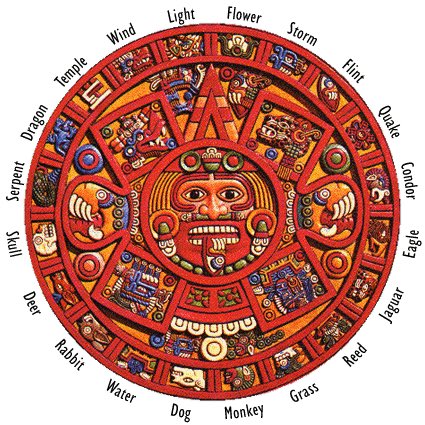“Mayan Calendar: 2012”
With all the recent controversy over the apocalyptic and cataclysmic events surrounding the ancient Mayan calendar, I thought it prudent to implement my interpretation of the gross and misleading facts surrounding this fascinating and ancient civilization. In the years between 250 and 900 C.E, (commonly known as the “Classic Maya” period), developments in Astronomy, Science, Math, and Calendrical events were brought to their highest achievements by the Mayans. Like the Europeans and ourselves today, they had a zealous obsession with their place and purpose in the universe. In order to place events in a “proper” time frame, they created not 1 but 2 calendars to suit this purpose; however, many experts on this subject have a general consensus that they may have even placed as much as 17 calendars to regulate their cycles of existence. But I shall deal with only 2 here. First, the “Calendar Round. “This consisted primarily of 52 years; the average lifetime period for a Mayan. In this version of interpretation, Mayans chiefly used this for daily purposes of a person’s life, crowning achievements such as marriages, the birth of children, military accomplishments and defeats, and a person’s death (52 years of a person’s life was considered old age). Nothing too fancy here; it is the second one that has created all the controversy. To properly calculate the cosmos and heavenly movements, they required a second calendar. It is worthy of mention though, that at the end of the 52 year cycle, the Mayans would perform elaborate and theatrical “fire” ceremonies to ensure the continuance of the cycle of life and death. Secondly, the “Long Count” calendar came into use. According to at least one of the ancient creation myths of these people, the world was created 3114 B.C; this claim translates to 5,126 years of “prosperity” and growth largely based on lunar cycles that they observed without the aid of telescopes; this is remarkable! Do the math: If you subtract 5126 from 3114…you get 2012. Now, where does Dec 21 fit into all of this? It doesn’t. On December 21, 2012, the beginning of the winter solstice commences in the western hemisphere. And since MOST of the Mayan calendars began their ritual observances in the summer and in “general theory” ended most of this in the winter, it is no surprise that December 21 ends their period of productivity. (The Mayans did not have a “December” in their calendar.) Mayan beliefs flourished in a world of religious symbols and metaphor; the stars and the planets were not dead to them. They were “physical” representations of their Gods. That is why they calculated their movements. From the celestial paths of the planets and stars, the Maya created complex and intricate prophecies in every aspect of their daily lives. December 21,2012 can possibly be suggested as a time that their ancient Gods make a harvest of their creation; that is, upon a proper spiritual path; humans join the God’s in eternal bliss. To expand further: Mayan language and writing, much like the ancient Egyptians, was deeply and mysteriously submerged in the encoding of hieroglyphics. Their concept of time and ideas are still not accurately identified. But it is presently agreed among archaeologists and scholars that their ideas and values of the physical and spiritual world of their residence solely rests in the astrological movements of their calendars. Nowhere in their literature or religious beliefs did they purposely state that the world would have an end; on the contrary, the world is under continuous reform and development. Whatever the significance of the date is, WE are emphasizing it more than the ancient Mayans did. In summary, there is a book worthy of mention that you can obtain. It is entitled “The Mayan Prophecy: 2012” by David Douglas. But you must be able to get past all the Mayan terminology and semantics in order for the book to present its material in a convincing attitude. So go to bed without worrying about the “end of time”; the Mayans did.
© 2024, Mark Grago. All rights reserved.




